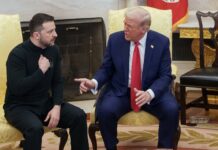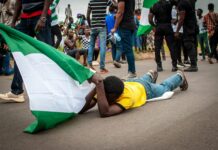
Over the last few weeks, we have seen nationwide protests across Kenya. Almost as soon as the demonstrations had began, we have seen protesters met with violence at the hands of the Kenyan police. The Kenyan police immediately sought to violently disrupt the demonstrations. Right from the onset we saw the police firing on protesters with tear gas and water cannons at protesters.
This sort of crackdown, unfortunately, is not unprecedented in Kenya’s history. In fact, violent crackdowns on peaceful protesters by police are basically to be expected. This is despite the fact that Kenya is supposed to be a democracy, where people should be free to express themselves and engage in peaceful demonstrations. The right to freedom of expression is often serverly curtailed by the actions of Kenyan police against protesters.
The violence from Kenyan police has so far seen the deaths of tens of protesters across the country, with many more injured. Even Kenya’s president, William Ruto, has gone on the record to state that protests have been peaceful. However, whenever he makes that statement he likes to add the caveat that the protests have been infiltrated by violent actors. Despite him acknowledging that the protests have been peaceful, he has avoided waging any sort of criticism towards the Kenyan police response.
The victims of this violent police crackdown will likely never receive any kind of justice for their death or injuries. Neither is it likely that there would be any kind of accountabilty of the police officers who have shot and killed protesters.
Similar kinds of responses by police against protests are not uncommon around the continent. Even though many of our countries would claim to be democracies, the reality on the ground is often different. The right to protest is a fundamental part of democracy. If protesters are immediately met with violence from police anytime they want to hold demonstrations, that is not democracy.
Similarly in Nigeria, we have seen the rights of people to peacefully protest being stifled. It is extremely common for Nigerian police to open fire on peaceful protestors. There is always a genuine risk to one’s well-being attending protests in Nigeria, as such incidents occur so frequently. One of the most notable incidents in recent memory was that of the Lekki Toll Gate Massacre when the Nigerian military opened fire and killed several peaceful protesters at the height of the #EndSARS protests.
The reason for these violent crackdowns is because governments understand the power of protests. In Kenya, we have seen the withdrawal of the tax bill that had been put forward by Ruto’s administration. That withdrawal was a direct result of so many young Kenyans gathering in the streets and voicing their opinions opposing the government’s tax bill. It unfortunately has come at the expense of the lives and injuries of protesters as a result of the violent police crackdown.
Governments know that major protests can cause their government actions to be put under a great deal of scrutiny. Because it is often the case that international media outlets take note of protests. The reality is that, were it not for the massive demonstrations that have taken place, we likely would never have known about the proposed tax increases by the Kenyan government.
Similarly in Nigeria, the high rates of police brutality by Nigerian police, especially with the Special Anti-Robbery Squad (SARS) had been put on display to an international audience. In recent times, the labour union strike that had been led by the National Labour Council (NLC) demanding higher minimum wage, received a lot of international attention as well.
These examples are obviously not only present within Africa but across the world. The massive demonstrations that have taken place against the Israeli government over the last year over their actions within Gaza have highlighted the struggles faced by the Palestinian people. Likewise, we have seen major protests in Israel against Netanyahu’s government, demanding the release of hostages and calling for his resignation as prime minister. Another example that comes to mind is the Black Lives Matter protests against police brutality that took place in the United States following the death of George Floyd.
The right to protest is a vital part of democracy. Actions taken by governments and their security forces to undermine people’s right to protest should always be taken seriously. Even in cases where we may not agree with the messaging of protesters, it is important that in our society is everybody given a chance to voice their grievances. It is vital that everyone has the opportunity to freely express their grievances and frustrations through peaceful protest. The violent crackdowns against protesters across Africa hinder our collective progress and undermine our fundamental right to be heard.










